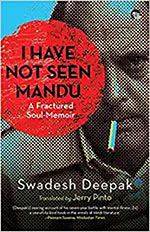There are few book reviews that can begin with a ‘must-read’ recommendation and this is one. The book is an intimate capturing of an author’s journey into the dark abyss of mental illness, his inability to comprehend his reality and the world, the journey to come to terms with it—finding his way back to his words—writing this book and some more plays and then getting lost forever. This sense of loss is the kind of foreboding throughout the book—the loss of one’s capacity to write, to express in words their pain, confusion and suffocation—the loss of loved ones to an illness they don’t understand, a loss of control over one’s actions and thought, a loss of respect—loss seems to be a theme entrenched in the narrative.
This book is important for everyone who wants to understand mental illness, for everyone who may feel that they are the only ones dealing with demons in their heads which they are unable to conquer, for everyone who has been a caregiver to someone suffering from a breakdown, for everyone in the profession of helping people deal with psychological difficulties. For it is an educative book for everyone who wants to believe that mental illnesses are not a big deal and can be ‘cured’ by better self-care. It is a time in human history where we are coming to terms with the unlimited potential of the human mind, and perhaps also slowly recognizing the other end as well—the fact that there are innumerable possibilities of mental illnesses and psychological breakdowns. This book is also important for everyone craving a deeper understanding of the happenings in the mind of the one suffering from a breakdown.here are few book reviews that can begin with a ‘must-read’ recommendation and this is one. The book is an intimate capturing of an author’s journey into the dark abyss of mental illness, his inability to comprehend his reality and the world, the journey to come to terms with it—finding his way back to his words—writing this book and some more plays and then getting lost forever. This sense of loss is the kind of foreboding throughout the book—the loss of one’s capacity to write, to express in words their pain, confusion and suffocation—the loss of loved ones to an illness they don’t understand, a loss of control over one’s actions and thought, a loss of respect—loss seems to be a theme entrenched in the narrative.
Continue reading this review

